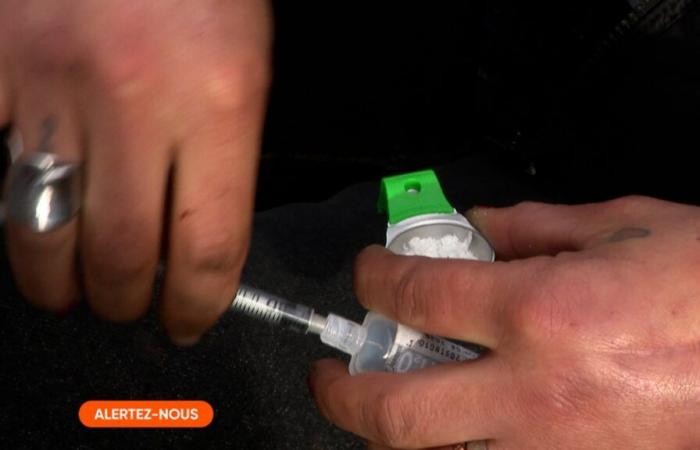With the departure of various employees, services were reduced and “what is done now is social support, but there is no longer any consumption“.
This is really the problem for Sébastien and the other people who used to benefit from the services of the SCMR. “It’s a shame. We saw in your newspaper that people will consume in the tunnel. There, we had a place where we were safe. There were nurses, educators… If someone felt unwell, a nurse arrived. It wasn’t just about consuming, there were competent people to supervise us. “, deplores our alert.
It’s a scumbag
For the forty-year-old, taking drugs is a physical need. “At first, when we take it, we are not sick, but the brain remembers the well-being it gave us. Obviously, when we are offered it again the next time, we don’t say no because we’re not sick. (…) It’s a vicious circle“.
“It ruined my life. I’m 47 years old and I have nothing. I zone from right to left“, he adds again, disappointed. However, he tried to get out of it. But the results were not there. “I tried treatment, but nothing helped. The desire must come from within yourself, but even if you want it, it’s complicated. It’s rubbish. It’s the worst filth I’ve consumed“.
Already totally addicted to heroin, Sébastien and other users are today exposed to another danger in their consumption. “Heroin in Belgium is starting to be cut with fentanyl. A product a thousand times more powerful than heroin“, specifies our alert. An additional reason to seek social and medical support.
Financing that will evolve
Tuesday, in response to the deputies, the Walloon Minister of Health, Yves Coppieters spoke on the future of the lower risk consumption room in Liège.
Minister Engagés fully recognizes the advantages of this type of room. “They not only reduce health risks for drug users, but also improve the safety and quality of life of the surrounding population.“, he assures.
“Currently, lower-risk consumption rooms, including that of Liège, are still financed on the basis of optional subsidies, which inevitably leads operators to be in a situation of uncertainty as to the sustainability of their actions and projects.“, estimates Yves Coppieters. He argues that the Liège room has received its subsidy for 2024, but that “for the next few years, as you know, the Government plans to simplify the procedures for optional subsidies“.
“With this in mind, we are not going to renew the three-year agreement which linked the TADAM foundation to the Walloon Region in favor of a new formula more suited to the future.“
No advanced date yet
Yves Coppieters assures that he is in contact with “the project leaders of Liège in order to move towards a constructive solution“. He also emphasizes having been informed of “project management difficulties” and wishes to shed light on this above all else.
A study is currently underway concerning the subsidy of the room and “provisional results will be available in 2025. Final conclusions are expected in March 2026.”
“I will of course take the results of the study into account in the policies that I will put in place aimed at multidisciplinary management of addictions and dependencies.“, concludes the minister.
The big change to come is “the fact is that we organize a three-year financing organization towards a five-year one (in general)“, the minister’s office subsequently indicated. This new organization will require “a transitional year of preparations for the granting modalities/files to be submitted“.
The ball is in their court
We will therefore probably have to wait several more months before seeing the regional government provide new funding for this room.
In the meantime, people who can no longer benefit from it no longer have any other option: “We will consume in the street“, deplores Sébastien. “The police will see us and arrest us to confiscate the product. We already have difficulty making 20 or 30 euros to buy the product, then the police will take it from us.”
A fear shared by the mayor of Liège, Willy Demeyer: “There will likely be more street consumption.“
For the chosen one, “the ball is in the court of the Walloon Region“. He also pleads, and above all, for a comprehensive policy to combat consumption across the entire country. “What is especially worrying is the lack of global reflection on the problem in Belgium. I asked the trainer Bart De Wever to have a global and integrated reflection on the problem. Denying the problem is dangerous“.







